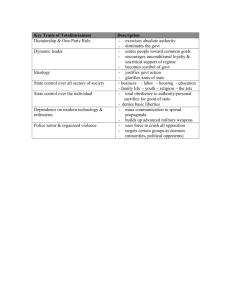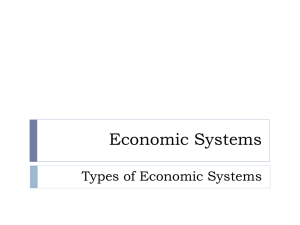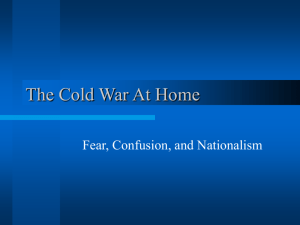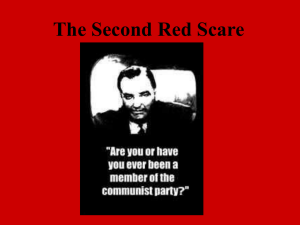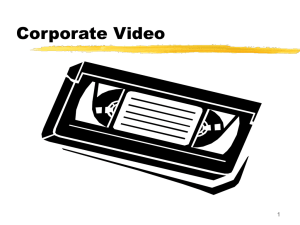The Cold War in America
advertisement
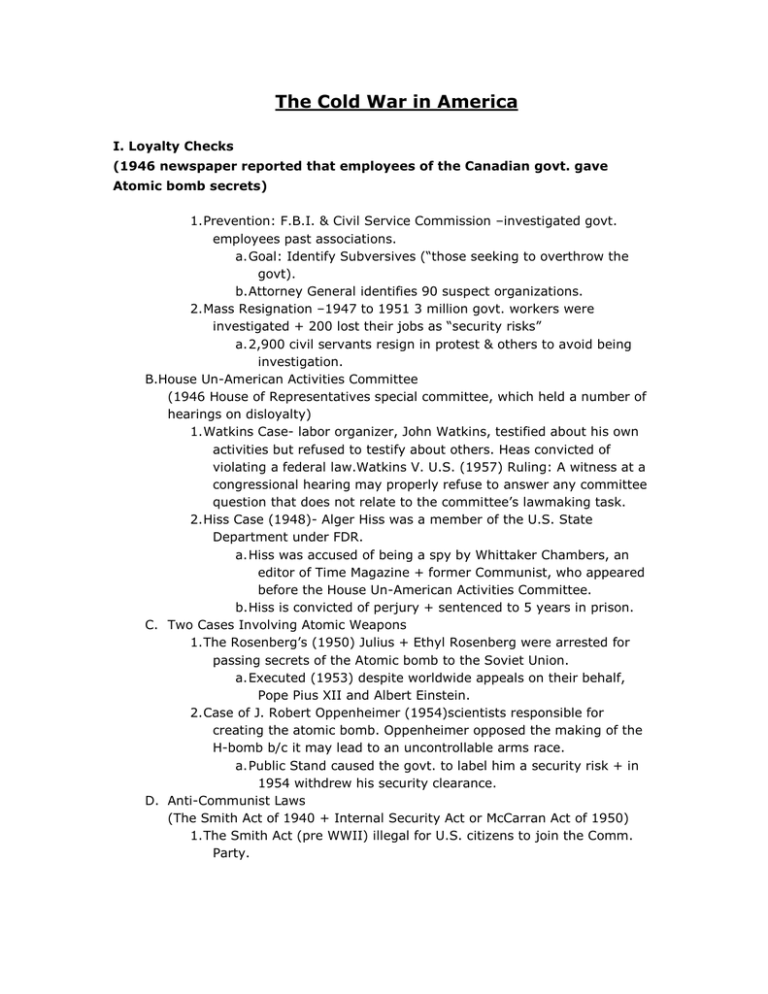
The Cold War in America I. Loyalty Checks (1946 newspaper reported that employees of the Canadian govt. gave Atomic bomb secrets) 1. Prevention: F.B.I. & Civil Service Commission –investigated govt. employees past associations. a. Goal: Identify Subversives (“those seeking to overthrow the govt). b. Attorney General identifies 90 suspect organizations. 2. Mass Resignation –1947 to 1951 3 million govt. workers were investigated + 200 lost their jobs as “security risks” a. 2,900 civil servants resign in protest & others to avoid being investigation. B.House Un-American Activities Committee (1946 House of Representatives special committee, which held a number of hearings on disloyalty) 1. Watkins Case- labor organizer, John Watkins, testified about his own activities but refused to testify about others. Heas convicted of violating a federal law.Watkins V. U.S. (1957) Ruling: A witness at a congressional hearing may properly refuse to answer any committee question that does not relate to the committee’s lawmaking task. 2. Hiss Case (1948)- Alger Hiss was a member of the U.S. State Department under FDR. a. Hiss was accused of being a spy by Whittaker Chambers, an editor of Time Magazine + former Communist, who appeared before the House Un-American Activities Committee. b. Hiss is convicted of perjury + sentenced to 5 years in prison. C. Two Cases Involving Atomic Weapons 1. The Rosenberg’s (1950) Julius + Ethyl Rosenberg were arrested for passing secrets of the Atomic bomb to the Soviet Union. a. Executed (1953) despite worldwide appeals on their behalf, Pope Pius XII and Albert Einstein. 2. Case of J. Robert Oppenheimer (1954)scientists responsible for creating the atomic bomb. Oppenheimer opposed the making of the H-bomb b/c it may lead to an uncontrollable arms race. a. Public Stand caused the govt. to label him a security risk + in 1954 withdrew his security clearance. D. Anti-Communist Laws (The Smith Act of 1940 + Internal Security Act or McCarran Act of 1950) 1. The Smith Act (pre WWII) illegal for U.S. citizens to join the Comm. Party. a. Created before WWII, the law prohibited any group from advocating or teaching the violent overthrow of the U.S. govt. It also prohibited someone from belonging to such a group. b. Dennis etal V. U.S. (1951) Challenges the Smith Act ***Did the Smith Act violate the first Amendment? i. Communist Party member-Eugene Dennis = 10 others admitted to being members. Dennis made speeches that the govt. viewed as a threat to national security. ii. Ruling: Upheld convictions—Dennis’s speeches created a “clear + present danger” c. Yates V. U.S. (1957) Ruling: A speaker must encourage people to do something, not merely believe in something. (Any idea could be advocated so long as the speaker did not urge people to commit dangerous acts). 2. The McCarran Act (1950) or the Internal Security Act (aimed at “Communist-front” organizations) a. Register w/ the Attorney General- all Communists + Comm. Front-org. must file membership lists + financial statements w/ Attorney General. b. Prohibited Employment in National Defense Plants. c. Prohibited entry to the U.S.-by Comm. or former Comm. E. Accusations of Senator McCarthy –fear of Communists influence + subversion grew intense during the years of theKorean War 1950-1953). 1. Rise of McCarthy (1950) Senator McCarthy gave a speech indicating he had a list of “card carrying” members of the Comm. Party who worked in the State Dept. a. Played on anticomm. Fears + suspicions of the American public. b. Conducted Senate committee hearings c. Led committee that investigated actors, writers, educators, + others suspected as “Communists Sympathizers”. d. “Blacklist” (refuse to hire) those under investigation, some whose Constitutional rights were disregarded + falsely charged, lost their jobs + found it difficult being hired. 2. Fall of McCarthy (1954) a. Challenges the U.S. Army-accused Army of having Comm. w/I b. Televised to the Public-20 million people watched the McCarthy hearings from Apr-June 1954. His bullying tactics caused him to lose favor in the public’s eye. c. Lost Support –public opinion + political support waned Dec’54 officially censured d. McCarthyism – term used to describe “the use of reckless + unfair accusations in the name off suppressing political disloyalty”
